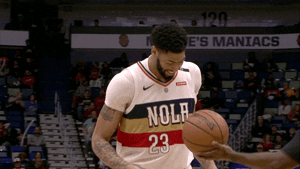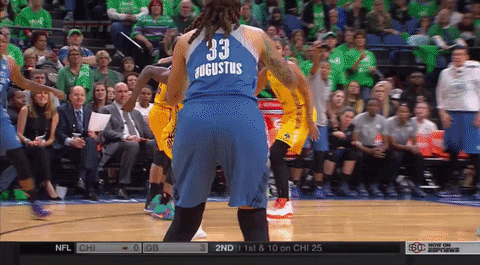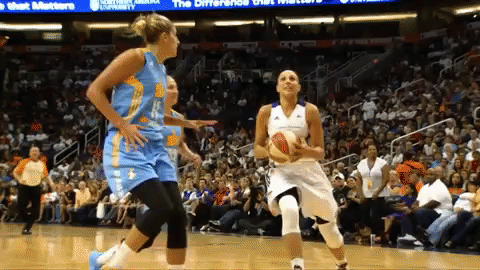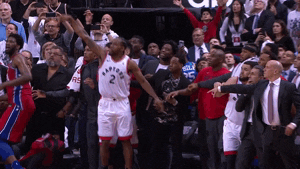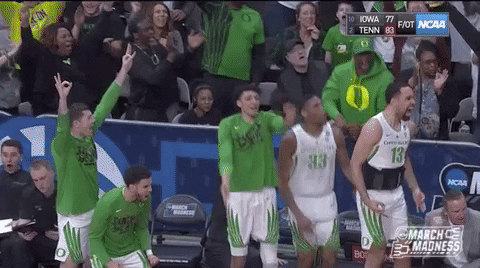Podcast Episode 38: Why aren’t there more Black coaches?
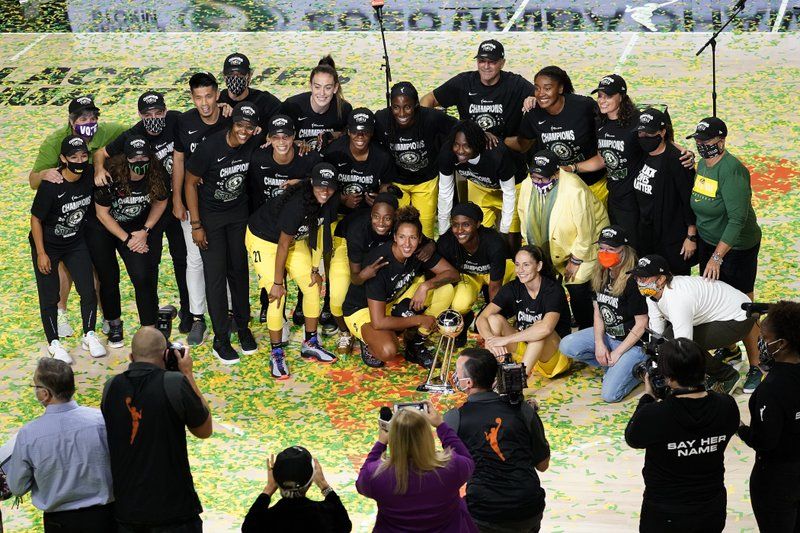
Listen to this episode of The GIST of IT here.
Ellen: What is up GISTers? Welcome to The GIST of It, I'm Ellen Hyslop.
Steph: And I'm Steph Rotz.
Ellen: And we're just two old pals and we're two gals and we're here to give you the gist of what's going on in the sports world. Let's get to it.
Steph: Ellen!
Ellen: Steph!
Steph: It's your birthday. Happy birthday, Ellen.
Ellen: Thank you, Steph. Much appreciated.
Steph: Let me know how twenty eight is.
Ellen: Yeah, this will be you in a week and a half.
Steph: So you've got new glasses as well. Ellen's looking great everyone.
Ellen: Yeah. With my age my eyes actually got worse, which meant I needed to get new frames, new lenses. Thanks to everyone who's listening. That's a great birthday present. Really appreciate that. If you could actually do one thing for us for our birthdays in these next couple of weeks, if you want to just share the podcast a little bit more, tell your friends that's all that Stephanie and I ask for our birthdays in the next week or so. But anyway in more important news than my birthday, the Seattle Storm, our WNBA champions.
Steph: Wow. I don't want you to discount the birth of Ellen Hyslop, first off, but I think this is, you know, within the orbit of equally important things. The Seattle Storm is doing a sweep.
Ellen: A sweep over the Las Vegas aces. And we predicted this. And I think that a lot of people predicted this. The Seattle Storm just have the star power in the WNBA, unlike anyone else. And it's just been such a joy and a pleasure and honestly a privilege to be able to watch Breanna Stewart and Sue Bird come back from season ending injuries last season in twenty twenty. I honestly think that they're better this year than even what they were in twenty eighteen when the Seattle Storm won the championship that year too.
Steph: And tonight I learned that Breanna Stewart has a seven foot one wingspan.
Ellen: Honestly, I don't even know because I'm trying to picture what a seven foot one human looks like, let alone a seven foot one wingspan. Sometimes for the Olympics, they'll put the athletes on that pedestal and they'll basically do that cool kind of look around their body and look at their wingspans and look at how fast they can move. I remember them doing this for Michael Phelps with swimming. I would love to see Breanna Stewart on one of those things and them just dissecting how athletic her body is.
Steph: Yes, yes. And Sue Bird, also one of my favs. So I'm happy for the Storm.
Ellen: Yes, very happy for the Storm. And it's actually a WNBA record that Breanna Stewart set by scoring over twenty points in six straight finals appearances. The storm swept in twenty eighteen and they swept in 2020 and she scored over twenty points in each of them and I still think we have to give a shout out to the Aces. I mean, as much as they were swept, the Wubble has been hard. Players have been playing basically every other game and the Aces did look tired. They do have league MVP A'ja Wilson on their team. You couldn't just rely on her to be able to get through every one that is on the Seattle Storm. There's a number of other players in addition to Sue Bird and Breanna Stewart. So we've got to tip our hats off to them, too. And I think just tip our hats off to the W: how successful they have been in hosting this tournament and in the Wubble, bringing awareness to Breonna Taylor being part of those wildcat strikes, bringing awareness to the November 2nd election and getting people to register to vote. I just think everything that the WNBA has done this year deserves a huge applause.
Steph: Yes, every one of those teams had success this year. Obviously, between the WNBA coming to a close this season, the NBA happening, there's a lot going on. But today we were inspired by our go to Lindsay Gibbs, who wrote a piece for her newsletter, Power Plays, all about the lack of black female coaches in the WNBA. And it also got us thinking about the lack of black coaches in all of the leagues that have the majority of black players. So unfortunately, the results are a little shocking or not shocking, depending on who you ask. So let's get into it.
Ellen: All right, Steph So first, as always, we have to set the stage for our conversation today and to set that stage, I'm going to hit you with some numbers. So first, looking at the WNBA, which is arguably the most prominent women's sports league in the world, 88 percent of the WNBA is composed of black women. However, of the 12 teams in the W, four are coached by women, two are coached by black men, and the remaining six are coached by white men. So following this math for the first time in the WNBA twenty four year herstory, there are zero black female coaches in this league. And for the third year in a row, the two finals teams have been coached by white men. So that's looking at the WNBA. Moving on to the NBA. It's important to note that 81 percent of players in this league are black. But of the 30 teams in the NBA, there are only five black head coaches in the league with four current vacancies for hiring. So they could also be filled by black men and women, which would be great. But so far, only five black head coaches in the league. And to no one's surprise here, all head coaches in the NBA are men. There are no female head coaches. However, there are 14 female assistant coaches, which is the most of any major league. So I think that that's huge kudos to the NBA for starting at least on that gender diversity hiring. And finally, looking at the NFL, 70 percent of the players on the gridiron are black, however, worse than the NBA. Of the 32 teams in the NFL, so two more teams in the NFL than the NBA. There are only three black coaches. And I also thought that I was important to point out that there are only 10 black quarterbacks. But as much as I say only, it's actually a record number of black quarterbacks in the league this year. So we're seeing some progress in that quarterback front. As for women, same as the NBA, there are no female head coaches, but there are four women working as assistant coaches and there are 15 women working as coaching interns this season. And there are a lot of coaches on an NFL team. So those coaching interns are also incredibly important positions. So shout out to all of those women who are trailblazing there. And the last thing that I think for us, Steph, is always important to mention. There are no openly gay male coaches in any of these major leagues.
Steph: I think it's really important that we're looking at sports that do have a majority of black players in their league, as most of the time, if you play the sport, you'll be interested in staying in the sport in some capacity and potentially coaching and theoretically have the resume to do so to coach. But in the NBA, out of the nine current coaches who used to play in the league, seven are white and two are black. So we clearly aren't living in a meritocracy. And when thinking about the WNBA stats on white male coaches, it does make me wonder if the trend towards hiring male white coaches in the W aligned with thoughts on needing to quote unquote, bring legitimacy to the league and is now a reflection that the W is a legitimate league x amount of years later. Now that we're seeing so many white male coaches that this is the sentiment, obviously, that I think no one in an organization would go on record to say, and it's obviously not a sentiment that I'm in favor of, but I wanted to point out this line of thinking and to help uncover our unconscious bias and how we've been brainwashed that you have to be accepted by the dominant powers, so in this case, by straight white men in basketball to be successful. And also because we've been led to believe that we do live in a meritocracy, right? And we assume that those who have all the money and those who control these economies and these leagues are the most qualified to do so. And I think of this as a quote unquote dominant supremacist culture. I don't have any sources or theories to throw this back to, but it's definitely something that I've anecdotally seen throughout my entire life in sports. And this needing to affirm your existence through the white dude and your importance for the white dude in sports. To make a non sports comparison, it's kind of how Canadians feel the need to leave Canada and to be celebrated in the states in order to be considered successful back home here in Canada. It's kind of the same thinking.
Ellen: Mm hmm. Yeah, I'm glad you brought that up, Steph. I've never really thought of that dominant supremacist culture beforehand. Maybe because this is a Steph theory and this is the first time that I'm hearing it from you, but I've never really thought of that beforehand, and I also think back and reflect Steph to when you and I would have been playing really high level sports and I'm looking back on when I was playing club sports, I never had a female coach. All of my coaches, both head coaches as well as assistant, outside of figure skating, which is a very female heavy sport. All the coaches were men.
Steph: And I think about how the few female coaches that I did have, how the team treated them differently, listen to them differently.
Ellen: Yeah, no, it's super interesting, you know, and I think to be clear, when we're talking about these things, it's not like you or I are poopooing on these leagues. I think when we look at the NBA as well as the WNBA, they've been at the forefront of diversity and inclusion. And they want to also be having this conversation. They want more diversity within their coaching staff. You know, something else I was thinking about is that we talk so much about representation and that you need to be able to see someone else who looks like you or is in a similar position to you to know that it's something that you can go after in a career and someone that you could be inspired by. And we talk a lot about female athletes and we talk a lot about black athletes and we still need more women's sports on TV. We definitely need to put women's sports on TV, but we are so lacking in that coaching category. And it's almost like that double layer on the athlete category that we haven't touched on yet in this podcast. And these players, these pro players need to see black coaches. They need to see female coaches and they need to see black female coaches in order to see that, hey, this could be a career for me just as much as it is a career to play the sport.
Steph: Especially in the head coaching category too you broke down the difference between assistant coaching and head coaching and the gender gap there. Going off of what you said, Ellen, about representation. It's key not only for people who want to envision themselves in those roles, but it's also key for those doing the hiring, the team owners organization's head coaches, depending on the sport, etc.. There is an existing bias that we've touched upon that white men make good leaders. And that's been a part of our cultural narrative. So representation affects both the hiring process, the hiring of head coaches in all sports, men's sports and women's sports. A basketball writer for The Times spoke a little bit about this. Sopan Deb talked about this double standard, noting that black assistant coaches in the NBA are often categorized as a quote unquote, players coach and then told they're too close to the players when a head coach position opens up. And there's a conflict, so there's so much about perception and internalized racism, internalized sexism involved in how we perceive coaches and how we allow them to move through the pipeline.
Ellen: Totally, how we perceive them, and also the language around that, too, is also super important in the way that we think of language, in the way that we use language towards the non male, nonwhite, non straight coach. It's super interesting. And, you know, Steph in this conversation, I do think it's important to kind of talk about what these leagues are doing in order to encourage diversity among their coaching ranks, no matter what level in coaching. So I want to take a look at the NFL, because they're the ones that are struggling the most out of all the majority black leagues with black players. But the NFL has what's called the Rooney Rule. And this rule requires that at least one woman and one underrepresented minority be considered in the slate of candidates for either every open position or every open senior position. This rule is named after former Pittsburgh Steelers owner Danny Rooney. And Mr. Rooney was a white man, and he was also a part of the Diversity and Inclusion Council for the NFL. And his goal around this rule was that the NFL really needs to increase the opportunities for minorities to hold NFL head coaching positions. Really, that's what it was at senior positions, but it mostly was these head coaching positions. And the rule was implemented in 2003 after a study showed that black coaches, despite winning a higher percentage of games, were less likely to be hired and more likely to be fired than their white counterparts. So talking to basically exactly what you were just talking about, Steph, a study actually proved that. And this is why the NFL had to put this rule into place. So there has been some controversy around the Rooney Rule. And a lot of people have different opinions about whether a quota or something like this is important. So this isn't really a hiring quota, but it is an interviewing quota, meaning in my opinion, when we look at this rule, it's super important to get different people in the room and give them the opportunity to get in the room. I'm sure, Steph, you've had a lot of jobs where it's all about networking and it's all about who you know and a lot of the times who, you know, is also who you look like and that social social circle that you have. And if it's always going to be that white man who is making the final hiring decision, then it's likely that he is going to be hiring a white man who also looks like him. So, you know, here's the issue with the Rooney Rule, and it's really too bad to see. But the NFL only has three black coaches right now, as we mentioned. And that's the same number as 2003 when the Rooney Rule was adopted.
Steph: With this initiative, why not try it? Right. Like, I see that it was a first step, but we clearly can't stop here. It's not working. You just showed that it's not working. To bring in some data here, Arizona State University published a report in 2019 called "A Ten Year Snapshot of NFL Coaching Hires" that proved with data that the Rooney Rule didn't actually improve minority candidates' chances of being hired as a head coach. And a lot of this is because of that pipeline leading to the jobs in that pipeline is still super white. The studies show that since 2009, close to 40 percent of head coaches hired in the NFL were offensive coordinators. And ninety one percent of the coaches hired as offensive coordinators during that time period were white. This is one of many examples when you dig through the data as to why the Rooney Rule isn't specific enough to address the coaching problem that we're talking about. The exclusion of black coaches started long before the interview process or before the interview was scheduled, especially if black candidates or if women aren't already in these networks or already set up to escalate through the ranks in a specific manner. And also, if you're a black woman or a black man and you get hired as a head coach, how long are you given to bring your team success? Right. How long until you get fired? Who gets fired in the NFL? If you look at that data, too, in the past 10 years? And then who is who is the media bolstering as a potential hire too, what's everyone else saying? And how does the media talk about black coaches when they get the position versus a white coach?
Ellen: Yeah, those are all totally, really great questions and things that need to be considered. And I think, again, it is also coming back to the top where you have a league that is majority black and there's no reason why there shouldn't be majority black coaches as well. All of these players are incredibly smart and have the experience and have the know how to be coaches. Maybe some of them don't want to be coaches, and that's totally fair. But I'd have a hard time thinking that none of them or a very, very, very slim amount of them actually want to get into the coaching game. Otherwise, Steph, the W and the NBA don't have a Rooney Rule. I think with them, as we've talked about beforehand, diversity and inclusion is more entwined in their culture. Last month, NBA Commissioner Adam Silver said that he doesn't believe the NBA needs to have a Rooney Rule to create more diversity. What he did say is that he talked to all of the teams with coaching vacancies at the time about ensuring that they look at and interview a variety of candidates. The Seventy Sixers have been the only team that have filled their vacancy since Commissioner Silver talked to them. And they did fill it with Doc Rivers, who is a black man.
Steph: I see where the NBA is coming from because the Rooney Rule is essentially a prompt, like it's a place to start and it's something that you can point to as something that you can collect data and reflect on if it's working or not, if leagues do decide to do a Rooney Rule. So outside of the W or the NBA, I think it has to be one of many initiatives and it has to be constantly iterated on. \
Ellen: No, it can't just be like, oh, we made this in 2003. This is going to be the same. I mean, look at the frickin difference between 2003 and 2020. Were there even podcasts in 2003. I don't think so. There's so, so many changes and we have to keep up with the times. And if you notice, like with the NFL, everything moving backwards, you got to change that to wrap things up, this issue about the lack of women, the lack of diversity in the top ranks, the lack of black men, the lack of black women is nothing new in non sports corporations either. What we're talking about right now in sports is definitely reflective of what we're seeing in everyday corporations across society and across the world. However, given the intersection that sports has with culture and with business and the fact that sports are something that are supposed to unite people and that are so idolized by people and that people really look up to sports, it's just so important to me that sports really do lead the way in this conversation.
Steph: Mm hmm. And if there's any league that's going to lead the way in this conversation, my bet has to go to the W and to the NBA.
Ellen: Yeah, for sure. Ok, as always, to close out our podcast, we're going to feature a WTF moment slash story submitted by you, our GISTers. And this week's submission comes from Sarah in Seattle. I just love that alliteration. Go Sarah in Seattle!
Steph: Sleepless in Seattle. So this WTF moment is more of a yes, what the fuck is up moment. So the jerseys of U.S. women's national soccer team stars Christen Press and Tobin Heath, who just transferred to Manchester United from the NWSL, were the best selling Man U jerseys, including those of any male player three days after their signings.
Ellen: Man, that U.S. women's national team is absolute retail gold, first they sold out Nike's U.S. jerseys when they were in the World Cup last summer and now they're Man U jerseys are selling like hotcakes. It's just amazing.
Steph: Also, so many NWSL players are playing over in Europe right now, I guess, with the NWSL series wrapping up shortly. It does make sense, but it's going to be very interesting to see what happens with this all next year.
Ellen: Yes, to be honest, I'm completely confused and have no prediction on what any of the women's leagues are going to look like next year. Who knows if maybe they'll do something like the W players where they play in the W and then they go overseas or go to Australia. Does that still count as overseas? I think. They'll go overseas and they'll go and they'll play basketball. Maybe soccer players will end up doing something like that, too. I'm just not not sure. But anyway, that was a great WTF moment. I love that angle and how it wasn't like WTF. It's like, oh yeah WTF. So we'd love to hear your WTF moment. It can be from the pro sports world, the amateur sports world, or even just a WTF moment that you had in your own life over the next week. Please email Steph and I at pod@thegistsports.com with your WTF moment and you as our GISTers might be featured on next week's podcast.
Steph: All right, sports pals. That was the gist of it from Ellen and I. Thanks so much for tuning in. If you want to help us get the word out, please do leave us a review and hit those five stars. You can also tell your friends to subscribe to The GIST of It on Apple Podcasts, Spotify, Google Play or Stitcher.
Ellen: And if you like what you heard today, you have to sign up for our free twice weekly newsletter where we give you the gist of what's going on in the sports world every Monday and Thursday morning. So you can subscribe to that newsletter at thegistsports.com. And we've also linked to that in our show notes. Otherwise, as we've already mentioned, Steph and I would love to hear from you. You can get in touch with us over email at pod@thegistsports.com, or feel free to DM us on Instagram @thegistnews.ca or @thegistusa. Again, I'm Ellen Hyslop.
Steph: And I'm Steph Rotz.
Ellen: And this has been The GIST of It. Take care of yourselves and we'll chat next week.
